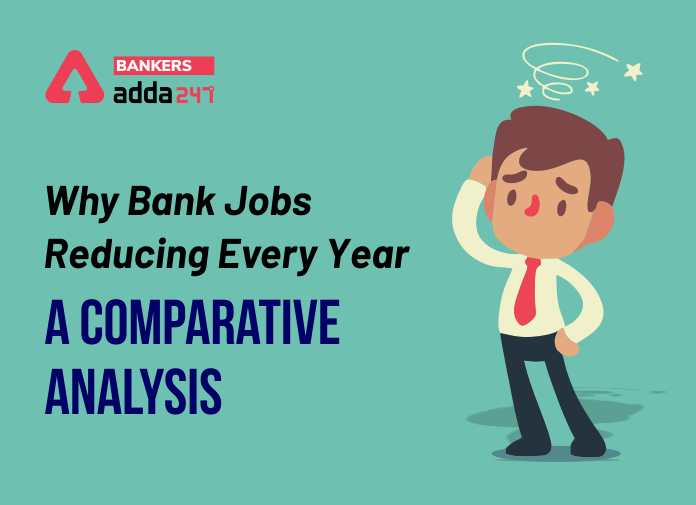The job crisis is one of the most prevailing concerns these days and this is due to the reduction of job vacancies in the government sector. Banks used to hire in huge numbers, however, for a few years the number of hiring has decreased. Every year the government is reducing the job vacancies which has a huge impact on unemployment in the country. The major factors that lead to the decline in banking jobs in the Government sector are the bank merger and slow privatization. The private sector banks have taken up the public financial sector and finance companies which reduces the number of job opportunities for the aspirants. Public financials, banking sectors, and Insurance companies that have been constituting around 1/6th of the total base of employees have seen a huge decline in employee headcount in 2019 and the situation is still the same in 2020.
Bank Government Jobs 2020: Latest Bank Government Jobs Vacancy
Impact of Bank Merger
Though with the bank merger, it is expected that the country would get an efficiently working bank sector. The bank mergers resulted in the rationalization of various bank branches, roles, and functioning of the employees get collapsed, shared resources, overcapacity, and excess staff. Cost imperatives are one of the key drivers of unemployment. This had out a huge impact on the Banking recruitment process. Over the years, there has been a constant decline in recruitment conducted by the IBPS for its member-banks for the posts of PO and Clerical.
Bank Merger: A total of 10 Public Sector Undertaking banks were merged into 4 Public banks with an objective to run 4 stronger and bigger banks in India, which in turn reduces the number of Public banks from 27 to 12. This mega-merger of PSU banks come into action from 1st April 2020 and the list has been provided below;
- Oriental Bank of Commerce and United Bank of India merged into PNB
- Syndicate Bank merged into Canara Bank
- Indian Bank merged into Allahabad Bank
- Union Bank merged with Andhra Bank & Corporation Bank
Also read; RBI Releases National Strategy For Financial Education: 2020-2025
Economic Slowdown:
The ace in the Indian economy is becoming more conspicuous with no signs of relief coming its way and by now it is but obvious to say that the Indian economy is going through a severe economic slowdown due to which the unemployment rate is higher than the previous year. RBI and the government is expecting GDP growth for the year to be at 5% in 2020. As per the latest reports, there is a huge decline in the employment trends, due to the offshoot of the economic downturn.
Impact of COVID-19 on banking jobs:
The continual spread of COVID-19 across the country has made a disturbance in the banking sector resulting in significant instability and volatility in global markets. As per the sources, there could be more adverse effects that banks could face due to the COVID-19 situation which in turn can reduce the number of recruitments to bring a balance in the banking sector. Due to COVID-19, the profitability of core banking has been reduced as the banks had provided moratorium loans to their customers’ that have reduced the income of the bank as a bank gets income from the repayments with interest. As the banks might be working with minimum staff even after the COVID situation to overcome the loss that in turn may reduce the number of recruitments per year.
Let’s understand the trend of declining vacancies
PO and Clerical posts are the most demanding posts for which every year lakhs of candidates fill-up the form and only eligible candidates got the chance to avail the vacancies. Since previous years, there has been a decline in the banking sector in both IBPS and SBI recruitment agencies. Let’s find out what’s happening in the banking sector for the last five years.
Institute of Banking & Personnel Selection
IBPS is the major recruitment agency which every year conducts examinations for the post of Officers and Clerical level, and to these posts, nearly 50 lakh candidates apply annually
Though there is a huge demand for banking jobs among the candidates, as per the reports, there has been a decline of 52% PO jobs in the last three years. The number of clerical vacancies has come down progressively to 1557 in 2020 from 12075 in 2019, while the number of PO posts dropped to 1417 in 2020 from 4336 in 2019 per IBPS data.
| Posts | 2020-21 | 2019-20 | 2018-19 | 2017-18 | 2016-17 |
| Officer | 1417 | 4336 | 4252 | 3562 | 8822 |
| Clerical | 1557 | 12075 | 7275 | 7880 | 19243 |
State Bank of India:
SBI conducts its separate recruitment examination for the selection of bank employees. According to the data states in March 2019, the total number of employees working in SBI has been decreased to 2,57,252 from 2,64,041 in 2018 even when the retirement rate was similar to the last few years. Though the vacancies for PO and Clerk are constant for 4 years, however, these are less when it comes to counting the number of applicants.
| Posts | 2020-21 | 2019-20 | 2018-19 | 2017-18 | 2016-17 |
| Officer | 2000+ | 2000 | 2000 | 2403 | 2313 |
| Clerical | 8134 | 8904 | 8301 | 7883 | 17140 |
Is there are less jobs in other government sectors too?
As a large number of private companies have started their businesses in India and slow privatization is resulting in a decline in the no of govt jobs. A workforce analysis reveals that there is the huge job loss in the public sector is one of the “worst in recent times”. The privatization has also affected Indian railway recruitments as most of the manual power has been replaced with machines and job security has turned out to be as that in the private sector.
Click Here to Register for Bank Exams 2020 Preparation Material
Bank Maha Pack Subscription (12 Months)




 Weekly Current Affairs One Liners 23rd t...
Weekly Current Affairs One Liners 23rd t...
 CSIR CRRI Typing Test 2025 Date for JSA ...
CSIR CRRI Typing Test 2025 Date for JSA ...
 Can Final Year Students Apply for SBI PO...
Can Final Year Students Apply for SBI PO...


